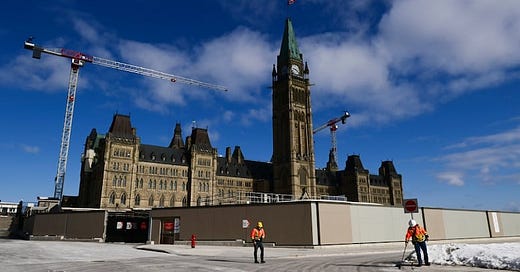Promises to Keep
Canada's first ministers are meeting next week, and the only thing on their agenda is building Canada. Plus, we have a new product to track federal promises.
First Ministers Meet
It is (already!) the end of May, which means there’s one month to go until Canada Day. Which means prime minister Mark Carney has one month to go to meet a couple of very high priority self-imposed deadlines.
The first is more a hope than anything: Carney wants Canada to get involved in a major new European defence rearmament plan. As he told the CBC, three quarters of Canada’s capital spending on defence goes to the United States, “and that’s not smart.” And with NATO poised to raise its baseline defence spending commitment from the current 2% of GDP to 3.5% (or even higher), Canada is going to have to step up quickly, since we are current the great NATO laggard at 1.37% of GDP. In the CBC interview, Carney said he would like to have something concrete to announce “by Canada Day.”
But in the meantime, Carney also has some serious domestic fish to fry, in the form of a new agreement on Canada-wide free trade. The prime minister has promised to eliminate all federal barriers to internal trade, again by Canada Day, with the hope that the provinces will also sign on to a more comprehensive plan to complete the common market across Canada that was one of the original motivations for Confederation in the first place.
Canada’s leaders are meeting in Saskatoon next Monday for what could be one of the more significant first ministers meetings in decades. Still, we are trying not to get excited here at Build Canada, because everyone is showing up with a shopping list of plans and projects and requests for funding or subsidies or tax breaks or regulatory exclusions. Ontario wants action on Ring of Fire, Nova Scotia is looking for help with offshore energy, Saskatchewan wants help with mining, Alberta wants a commitment on pipelines…
But here’s the thing: Carney has been saying it is time for Canada to “build, baby build.” We couldn’t agree more. There has been a lot of talk over the past few months about Canada finally getting its head around doing something about the myriad obstacles and bottlenecks and gatekeepers that have left us at the bottom of the growth charts in the OECD. Helping provide ideas that would eliminate those barriers is part of Build Canada’s mandate, which is why we are proud to announce our latest product:
Outcomes Tracker
We wanted to better understand what our federal government is working on. So we built a tracker to:
Understand key commitments
Track their progress over time
See how they impact outcomes
🧭 Check it out at buildcanada.com/tracker
What Else We’ve Been Reading
[T]he truth is obvious: we are in decline. The systems that once delivered rising prosperity no longer function in practice—they now produce delay, contradiction, and paralysis.
The reason is simple. We’ve spent a generation legislating luxury opinions—ideas that sound virtuous, cost nothing to say, and deny the trade-offs real progress requires.
🗞️ Canada can no longer afford to be governed by luxury beliefs [The Hub]
.
Canada’s infrastructure permitting regime is a maze of duplicative processes... critical mineral and metal mines should not have to be approved federally under the Impact Assessment Act when they are already heavily regulated through provincial impact assessment, provincial permitting and other federal laws.
🗞️ We tried to build, but governments made it difficult to impossible. Here’s how to fix it [Globe & Mail]






Suggested reading list for our times:
Prisoners of Geography: Ten Maps That Explain Everything About the Worldby Tim Marshall
The Next Civil War
Book by Stephen Marche
A bit absent from the discussion are major current issues of 1) our neighbor is turning authoritarian and xenophobic which will impact us in many ways from tariffs, taxes on Canadian companies in the US, and Canadian ending up in detention centers with limited due process 2) the risk of authoritarianism and fascist rise in Canada (how to fire proof our country against this)…note Toronto just passed a law that will make it easier for police to arrest any protesters under vague conditions (freedom of speech?!) 3) you can build all you want but second biggest issue for Canadians is healthcare and it will only get worse until real action takes place (healthcare also eats up a quarter of all public spending) 4) linked to all three issues but not really discussed is taxes and redistribution…can we tax upper classes and reverse inequality a bit to stabilize society and pay for some of the structural cost pressures we will face (defense, healthcare…). Let’s have a broader and deeper discussion please?